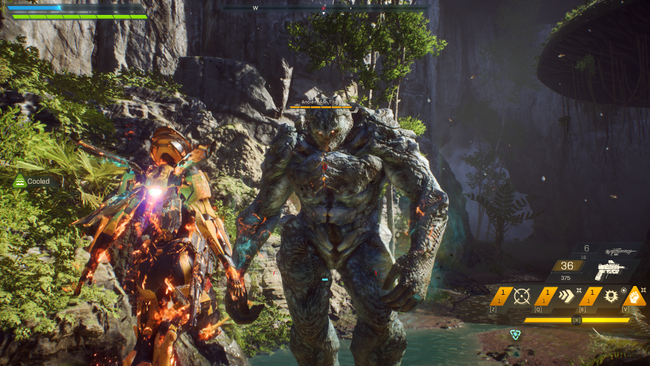I Didn’t Run, I Walked Away To Get A Better Me (Kritik (SA) Remix) from Catch 22 on Beatport
-
Release Date
2022-10-14 -
Label
Catch 22
-
Catalog
CATCh364
DJ Disciple collaborates with Just Valarie from Innervisions on ‘I Didn’t Run, I Walked Away To Get A Better Me’ remixed by the incredible
Kritik (SA) giving us another amazing version. Enjoy
Release
-
DJ Disciple,
Innervisions,
Valarie,
Kritik (SA)
-
Release Date
2022-10-14 -
Label
Catch 22
-
Catalog
CATCh364 -
In The Morning
Garas
Hive Label
Bioware reagiert auf massive Fan-Kritik
Anthem ist laut BioWare «hier, um zu bleiben».
Biowares Community Manager Jesse Anderson hat auf Reddit eine ausführliche Nachricht veröffentlicht, in der er auf die teils massive Fan-Kritik antwortet, welche die Entwickler seit dem Release von Anthem erreicht.
Er spricht verschiedene Themen an. Dazu gehört auch, warum immer weniger Bioware-Mitarbeiter in den Foren aktiv sind, oder warum es den Anschein hat, als würde sich das Team hauptsächlich um kleine, unwichtige Probleme kümmern.
Updates sind auf dem Weg:
Anthem — Riesen-Update will viele Kritikpunkte angehen, Fans sind optimistisch
Eine Frage der Formulierung
Nachdem er sich bei der Community und speziell beim Usier harishcs bedankt hat, der die wichtigsten Kritikpunkte der Fans zusammengefasst hat, erklärt er, warum vor dem Release wesentlich mehr Entwickler auf Reddit aktiv waren.
Anderson begründet das damit, dass sich der Umgangston deutlich verschärft hat. Während es für ihn als Community Manager normal sei, ständig mit negativer Kritik umgeben zu sein, sei dies für seine Kollegen nicht der Fall.
«Warum sollte ein Entwickler Zeit abseits der Arbeit am nächsten Update dafür verwenden etwas zu posten, wenn es sehr wahrscheinlich ist feindliche Antworten zu bekommen, oder wenn sie beleidigt werden, weil sie einige Fragen der Spieler nicht beantworten können?»
Er fügt hinzu, dass sich wieder mehr Team-Mitglieder an der Community-Arbeit beteiligen werden, sobald der Umgangston wieder respektvoller und konstruktiver wird.
11:04
Anthem — Test-Video zum Koop-Shooter von Bioware
Die kleinen Dinge im Leben. Ein weiterer Kritikpunkt war, dass Bioware scheinbar nur auf kleinere Probleme eingeht, anstatt sich den wichtigen Themen wie dem mangelndem Content zu widmen.
Anderson erklärt dazu, dass er auch die großen Probleme aus der Community weiterleitet. Auf kleine Dinge zu reagieren sei jedoch deutlich unkomplizierter, was die Reparatur immens beschleunigt. Nur weil er auf eine Kritik nicht antwortet, hieße das nicht, dass er sie nicht sehen und weiterleiten würde.
«Ich denke es ist besser so schnell wie möglich auf die Sachen zu antworten, auf die ich antworten kann, anstatt auf gar nichts.» Außerdem vermeide er es, unter jede Anfrage mit «Danke für das Feedback, ich werde es dem Team weitergeben» zu reagieren.
Einige Wünsche der Fans seien zudem bereits umgesetzt worden. So müsst ihr nicht mehr jedes Mal zur Schmiede laufen, um eine Mission zu starten und die Sichtbarkeit von Loot wurde überarbeitet. Für diese Änderungen gab es von den Spielern auch viel positive Kritik.
Noch mehr Feedback von Bioware:
Bioware verteidigt Anthem — Darum fehlen so viele versprochene Inhalte im Spiel
‘Keine Antwort’ heißt nicht ‘Keine Reaktion’
Anderson macht auch klar, dass er nicht in der Lage sei auf jeden Kritikpunkt zu reagieren, weil einige Themen nicht in seiner Hand liegen würden, oder weil er in einem Bereich nicht genug Expertise besitze.
Das betrifft vor allem das Fehlen von Inhalten und die Funktionsweise von Loot in Anthem. Die ursprüngliche Kritik von harishcs bemängelte unter anderem die Qualität der Story, die Qualität der Charaktere, die belanglosen Mikrotransaktionen und die nicht-motivierenden Belohnungen im Endgame.
Die ursprüngliche Kritik von harishcs bemängelte unter anderem die Qualität der Story, die Qualität der Charaktere, die belanglosen Mikrotransaktionen und die nicht-motivierenden Belohnungen im Endgame.
Der Community Manager geht zwar nicht genauer auf einen der Punkte ein, stellt allerdings klar, dass jeder einzelne dieser Punkte derzeit vom Team besprochen werde. Einige davon bräuchten jedoch ihre Zeit, um realisiert zu werden.
Anthem — Screenshots ansehen
Gute Antwort, oder leere Worte?
Auch wenn man bedenkt, dass Anderson letztlich um die essentiellen Probleme von Anthem in seiner Antwort, aus nachvollziehbaren Gründen, einen Bogen gemacht hat, stellt er zum Schluss klar, dass die Zukunft des Spiels gesichert ist: «Anthem ist hier, um zu bleiben».
Damit steht weiterhin die Frage im Raum, wie die Fans in Zukunft mit der Situation umgehen werden. Unter seinem Post finden sich viele Spieler, die sich für Andersons ausführliche und offene Antwort bedanken und derzeit eine spaßige Zeit mit Anthem verbringen.
Kritiker deuten jedoch darauf hin, dass die Antwort auf das Mindeste heruntergebrochen nur «Wir kennen die Probleme und es dauert noch, bis sie gelöst sind» lautet. Damit reihe sich Anthem in die enttäuschende Liste von modernen Service-Games ein.
Insbesondere Anderson Worte zum Umgangston gegenüber den Entwicklern finden offenbar sehr großen Anklang in der Community. Die meisten Kommentare rufen ebenfalls dazu auf, mehr auf konstruktive Kritik zu setzen und die Entwickler mehr willkommen zu heißen.
Was ist mit euch? Seid ihr zufrieden mit Anthems Entwicklung?
Was passiert in Anthem?
Hier findet ihr die kommenden Inhalte für März und April 2019!
16:25
So kann Bioware Anthem noch retten — Video: Ausblick auf Roadmap & Patches
Chukovsky-Khardzhiev-Mayakovsky: about whom was the Hymn to Criticism written?
I would like to thank E. Ts. Chukovskaya for her help in working on the article.
Korney Chukovsky’s acquaintance with Mayakovsky took place in 1913 during joint performances at Futurist evenings. In Chukovsky’s memoirs «Mayakovsky» this early period is represented by rather insignificant episodes, among which their common attempt to find a publisher for Mayakovsky’s book «Veil Jacket» is mentioned, then the memories switch to the summer of 1915, when Mayakovsky settled in the holiday village of Kuokkala, where Chukovsky lived with his family all year round. We will not cite well-known quotations, we will refer to the less well-known memoirs of Nikolai Chukovsky about Mayakovsky, where there are interesting details: us, and when he lived in St. Petersburg, he came to us on Sundays with his friends — Vasily Kamensky, Benedict Livshits, Khlebnikov and Kulbin 1 .
The memoirs of Nikolai Chukovsky, who turned 11 in June 1915, paint a picture of a completely idyllic relationship:
…Mayakovsky reigned at our table and, in fact, reigned supreme at it for two months. «A Cloud in Pants» he wrote while living with us. That is, he did not write, but composed while walking. I have seen it many times. He wrote down much later <…> My sister Lida and I <…> saw how he, long-legged, walked back and forth on sloping, slippery, splash-wet stones above the waves, waving his arms and shouting. He could shout at the top of his voice there, because the wind and waves drowned everything out. He came to dinner and at dinner each time he read a new, freshly composed piece of the poem. He read while standing. My father loudly expressed his admiration and made him read again and again. Many parts of «Clouds in Pants» I remember by heart since 2 .
«A Cloud in Pants» he wrote while living with us. That is, he did not write, but composed while walking. I have seen it many times. He wrote down much later <…> My sister Lida and I <…> saw how he, long-legged, walked back and forth on sloping, slippery, splash-wet stones above the waves, waving his arms and shouting. He could shout at the top of his voice there, because the wind and waves drowned everything out. He came to dinner and at dinner each time he read a new, freshly composed piece of the poem. He read while standing. My father loudly expressed his admiration and made him read again and again. Many parts of «Clouds in Pants» I remember by heart since 2 .
Nikolai Chukovsky did not hide some of the complications that arose at the same time. They had very specific reasons:
According to our family traditions, which are carefully concealed, Mayakovsky was in love with my mother in those years. I heard about it from both my father and my mother. The father spoke of this rarely and reluctantly, while the mother pointedly and proudly. She told me that one day my father kicked Mayakovsky out of our dacha through the window. If there was such an episode, it does not seem to have affected my father’s excellent relationship with Mayakovsky 3 .
She told me that one day my father kicked Mayakovsky out of our dacha through the window. If there was such an episode, it does not seem to have affected my father’s excellent relationship with Mayakovsky 3 .
K. Chukovsky was characterized by jealous feelings, and knowing Mayakovsky’s tendency to have affairs with married women, one should not be surprised at this suspiciousness. And Chukovsky’s wife, Maria Borisovna, was then young and, by all accounts, very pretty. But was that the only reason Mayakovsky was thrown out the window? This was later questioned.
Mayakovsky also mentioned his friendship with the Chukovsky family during his life in Kuokkala in his autobiography “I myself,” he named Chukovsky among his main patrons, although not without the usual bravado:
Seven-familiar system (seven-field). Made seven dining acquaintances. On Sunday we «eat» Chukovsky, on Monday — Evreinov, etc. On Thursday, Repin’s herbs were worse 4 .
«Seven Dinner Acquaintances» is a product of Mayakovsky’s usual myth-making. For example, one of his meetings with Repin in hot pursuit was described in B. Lazarevsky’s diary: there was no question of any invitations to Repin’s «vegetarian» dinners 5 . It does not seem that Mayakovsky was a frequent guest at N. Evreinov, who on June 26, 19For 15 years he wrote to V. Kamensky from Kuokkala: “Mayakovsky lives here. In general, «the devil is not so terrible as he is painted.» We are on excellent terms with him. But Chukovsky would not breathe on him like that…” 6
For example, one of his meetings with Repin in hot pursuit was described in B. Lazarevsky’s diary: there was no question of any invitations to Repin’s «vegetarian» dinners 5 . It does not seem that Mayakovsky was a frequent guest at N. Evreinov, who on June 26, 19For 15 years he wrote to V. Kamensky from Kuokkala: “Mayakovsky lives here. In general, «the devil is not so terrible as he is painted.» We are on excellent terms with him. But Chukovsky would not breathe on him like that…” 6
K. Chukovsky noted inaccuracies in Mayakovsky’s autobiography in this regard: “He did not have a permanent home. He lived either with me, or at the Trube Hotel (not far from the station), or at the artist Ivan Puni’ 7 .
It seems that there were far from seven families whose hospitality Mayakovsky really enjoyed that summer, his futurist friends were even sure that Chukovsky alone acted as Mayakovsky’s benefactor. D. Burlyuk in summer 19For 15 years he wrote to V. Kamensky: “Mayakovsky is in the Satyricon and is strenuously careering in Kuokkala, where Chukovsky (!) already lives a book and a preface” 8 .
Kamensky: “Mayakovsky is in the Satyricon and is strenuously careering in Kuokkala, where Chukovsky (!) already lives a book and a preface” 8 .
In the «Journal of Journals» under the heading «Writer’s Calendar» there appeared a sarcastic note «Career Paths», where it was said about the rapprochement between Chukovsky and Mayakovsky:
Vl. Mayakovsky is now taking a course in Kuokkala under the guidance of K. Chukovsky. The futuristic poet and artist is charged with the duty to write a couple of understandable lines every week, and on Sundays to sketch one or the other portrait so that the eyes are at least partially different from the tails of the “dry black cats”, and the ears would be located at least on the shoulders, and not on the hips. Mayakovsky does all this very diligently, with great diligence. And no wonder: everyone is flattered to get into the Niva. «Every man desires to be a deacon.» For the sake of such a perspective, one can sacrifice futurism 9 .
Because of his friendship with Chukovsky, who was then close to the literary department of the Niva magazine, Mayakovsky the futurist was suspected of apostasy out of a desire to be published in popular publications. About the forthcoming publication of a collection of Mayakovsky’s poems, the Journal of Journals, not without malice, reported:
Vl. Mayakovsky was already tired, obviously, of being a Futurist. The other day he is releasing a new book of almost completely “understandable” works. The preface to the book was written by… Korney Chukovsky 10 .
But here it was not about the book «Veil Jacket», mentioned by Chukovsky in his memoirs, but about the collection of Mayakovsky’s poems «For the First Acquaintance», which was to be published by the publishing house of the magazine «New Satyricon» with a foreword by Chukovsky. The history of this unpublished collection became, half a century later, an occasion for unpleasant questions for Chukovsky.
Questions came from N. Khardzhiev, who in 1932 had at his disposal the first page of Mayakovsky’s never published collection “For the First Acquaintance”, which was provided to him by A. Kruchenykh, as well as “the texts of proof proofs kept by Chukovsky”, one of which was stamped by the printing house: “Commercial printing press. St. Petersburg, Ligovskaya, 67″ 11 . Regarding these materials, Khardzhiev asked the question: “What circumstances prevented the publication of the collection“ For the First Acquaintance ”- Mayakovsky’s quarrel with the author of the preface or the publisher’s sudden refusal …” 12 But asking this question, Khardzhiev was convinced that he knew the exact answer to it , because in a sentence earlier, as if without any connection with the rest of the text of his note, he placed the phrase: “On July 9, the Hymn to Criticism was published in the New Satyricon.”
This was not a hint, not quite a hint, which Chukovsky, as will be clear from what follows, immediately understood. But even earlier, he was asked a number of questions about the «Hymn to the Critic» in connection with the discovery of an early copy of this poem, made by Chukovsky’s hand. The text of this list differed significantly from the final one; Chukovsky noted all the discrepancies on a separate sheet and attached a small comment “About my copy of the Hymn to Criticism”:
But even earlier, he was asked a number of questions about the «Hymn to the Critic» in connection with the discovery of an early copy of this poem, made by Chukovsky’s hand. The text of this list differed significantly from the final one; Chukovsky noted all the discrepancies on a separate sheet and attached a small comment “About my copy of the Hymn to Criticism”:
First of all, I will note the 23rd verse of this «Hymn»:
And soon the critic from the birthday udder.
I consider this reading to be the only correct one. I have heard «Hymn to the Critic» at least ten times in M-th’s recitation, and he always pronounced the verse in this way. Anyone who knows the style of Mayakovsky will agree with me that the “eminent name” is a fake, a typo, a distortion of one of the most characteristic lines of V.V.
Regarding the entire manuscript presented to me after 36 years 13 after its appearance, I can say the following: this is by no means an attempt to remember M-th’s half-forgotten poem, this is an exact copy of one of his draft manuscripts. At the time when he was writing his hymns for the Satyricon, he spent whole days with me (in Kuokkala, in a country house by the seaside). The “Hymn to the Judge” was written and rewritten at my table, and for a long time I kept with me a piece of paper where this hymn, rewritten by my hand, was illustrated (in rough, in the form of light sketches) by Radakov, the artist of the Satyricon.
At the time when he was writing his hymns for the Satyricon, he spent whole days with me (in Kuokkala, in a country house by the seaside). The “Hymn to the Judge” was written and rewritten at my table, and for a long time I kept with me a piece of paper where this hymn, rewritten by my hand, was illustrated (in rough, in the form of light sketches) by Radakov, the artist of the Satyricon.
February 1952 Moscow
K. Chukovsky 14
Here memory failed Chukovsky:
- Chukovsky N. About what he saw. Memories. Letters / Entry. Art. and comment. E.N. Nikitina. M.: Young guard, 2005. P.21. [↩]
- Chukovsky N. Decree. op. pp.23-24.[↩]
- Ibid. P.26. [↩]
- Mayakovsky V. Full. coll. op. in 13 vols. T.1. Poems, tragedy, poems and articles of 1912-1917. M.: Goslitizdat, 1955. P.23.[↩]
- B. Lazarevsky’s entry about the meeting between Repin and Mayakovsky, see: Katanyan V.A. Chronicle of the life and work of VV Mayakovsky.
 M.: Soviet writer, 1985. P.106. [↩]
M.: Soviet writer, 1985. P.106. [↩] - RGALI.F.1497. Op. 1. Unit ridge 193. L.4.[↩]
- Chukokkala. Handwritten almanac Korney Chukovsky. M.: Art, 1979. S.93.[↩]
- RGALI.F.1497. Op. 1. Unit ridge 184. L.40v. By this time, Mayakovsky’s poems “Hymn to the Judge” (February 26), “Hymn to the Scientist” (19March), «Naval Love» (June 18) and «Hymn to Health» (July 2). 1915. No. 10. [↩]
- S[olomin] I. Writer’s Calendar // Journal of Journals. 1915. No. 12. [↩]
- For the first time, N. Khardzhiev’s note «Mayakovsky’s unpublished book «For the First Acquaintance»» was published in the anthology «Poetry Day-68» (M.: Soviet writer, 1968). Cit. according to the modern edition: Khardzhiev N.I. Articles about the avant-garde. In 2 vols. T.2. M.: RA, 1997. P. 150. [↩]
- Ibid. P.151.[↩]
- That is, in 1951.[↩]
- Chukovsky K. About my copy of the “Hymn to Criticism”// Department of Manuscripts of the State Museum of VV Mayakovsky. F.1.
 Op. 2. Unit ridge 3. R-5539. L.1.[↩]
Op. 2. Unit ridge 3. R-5539. L.1.[↩]
Do you want to continue reading? Subscribe for full access to the archive.
Already subscribed? Log in to access the full text.
LitKult — Analysis of the poem «Hymn to Criticism» by Vladimir Mayakovsky
Author: Vladimir Mayakovsky
Category :
civil
The poem «Hymn to Criticism» by Vladimir Mayakovsky
Poems «Hymn to Criticism» by Vladimir Vladimirovich Mayakovsky is a caustic satire on dishonest literary critics.
The poem was written in the summer of 1915. The poet is 22 years old, he settled in Petrograd, his poetic performances often scandalize the public. By genre — satire, cross-rhyming, 10 stanzas. The title suggests a song of praise, but the content of the verse is satirical. The poet spent the summer in the hospitable family of K. Chukovsky, in the country. Meanwhile, there is reason to believe that the hymn is a hairpin against just K. Chukovsky, who was not only a writer, but also a literary critic. For example, the first quatrain is an unceremonious allusion to the circumstances of the birth of K. Chukovsky (he was illegitimate), the fifth stanza also points to a fact from a poor youth, when the writer walked around in already dilapidated pants. Yes, and the next stanza «from the Name’s udder» can be regarded as a hint at his pseudonym, playing on the name of his mother. Even the characteristic nose of K. Chukovsky is quite recognizable. However, V. Mayakovsky could use these strokes only for the authenticity of the collective image of a typical critic. In any case, the friendship has cracked. It also turns out that the invulnerability of the young V. Mayakovsky from the arrows of criticism was feigned.
For example, the first quatrain is an unceremonious allusion to the circumstances of the birth of K. Chukovsky (he was illegitimate), the fifth stanza also points to a fact from a poor youth, when the writer walked around in already dilapidated pants. Yes, and the next stanza «from the Name’s udder» can be regarded as a hint at his pseudonym, playing on the name of his mother. Even the characteristic nose of K. Chukovsky is quite recognizable. However, V. Mayakovsky could use these strokes only for the authenticity of the collective image of a typical critic. In any case, the friendship has cracked. It also turns out that the invulnerability of the young V. Mayakovsky from the arrows of criticism was feigned.
The origin of the character is proletarian, the stages of his growing up are described. «Blow of the knee»: in the ass (idiom). “The ability to penetrate easily and without soap” (by the way, in this stanza there is a homophonic rhyme, a pun): into the soul. «Newspaper sky»: irony. The poet treats with contempt the secondary work of this writing fraternity. “Like a line-by-line piglet”: not a bad amount. At one time, V. Mayakovsky was paid a ruble per line. Metaphor: milked a bun and a tie. That is, by dexterity of hands and tongue, he got his livelihood. “To touch the calves”: here V. Mayakovsky describes the critic, though no longer mangy, but a little dog. “Fat waiter”: that same “muzzle of a tradesman” who makes his assessments. By the end of his life, the critic has laurels no worse than those of the same poets, and he usually lives much better (in any case, beginner poets). «Decomposes in the newspaper»: association with stale fish. «Almshouse in Nice»: a well-deserved rest for hack writers. In the verse there is also a pathos befitting a hymn, only turned inside out, with a mockery. Comparisons: doves are whiter than mushrooms, grew from a log (an allusion to Pinocchio by C. Collodi). Epithets: refined games, graceful blow. Idiom: rinse your laundry (i.e., gossip, slander, prejudice).
The poet treats with contempt the secondary work of this writing fraternity. “Like a line-by-line piglet”: not a bad amount. At one time, V. Mayakovsky was paid a ruble per line. Metaphor: milked a bun and a tie. That is, by dexterity of hands and tongue, he got his livelihood. “To touch the calves”: here V. Mayakovsky describes the critic, though no longer mangy, but a little dog. “Fat waiter”: that same “muzzle of a tradesman” who makes his assessments. By the end of his life, the critic has laurels no worse than those of the same poets, and he usually lives much better (in any case, beginner poets). «Decomposes in the newspaper»: association with stale fish. «Almshouse in Nice»: a well-deserved rest for hack writers. In the verse there is also a pathos befitting a hymn, only turned inside out, with a mockery. Comparisons: doves are whiter than mushrooms, grew from a log (an allusion to Pinocchio by C. Collodi). Epithets: refined games, graceful blow. Idiom: rinse your laundry (i.e., gossip, slander, prejudice).
